Slovenia, Serbia and an EU-Balkan breakthrough in 2021
- Towards a breakthrough in four steps
- Can Slovenia produce a breakthrough, again?
- Reform, energy and realistic goals
- Annex and further reading
This newsletter is also available in Bosnian, Croatian, Montenegrin, or Serbian: Slovenija, Srbija i iskorak u odnosima EU i Balkana u 2021. godini
Dear friends of ESI,
In early 2020, ESI published a report on the crisis of the EU accession process in the Balkans: Hamster in the Wheel – Credibility and EU Balkan policy. We argued that the EU has a strong political and economic incentive to offer to any interested Western Balkan nation the chance to join its Single Market as an interim goal in a reformed two-stage EU accession process. And that there was a precedent for this: the "Finnish road to accession."
In January 1989 then European Commission President Jacques Delors faced doubts in Paris and other capitals about further enlargement of the European Economic Community. He found a way to address these concerns "without rebuffing those who are just as entitled to call themselves Europeans": a "structured partnership with common decision-making and administrative institutions" and access to the European Single Market. Finland, Sweden, Austria, Norway and Iceland took up his offer, started negotiations and became members of the European Economic Area (EEA) five years later, on 1 January 1994.
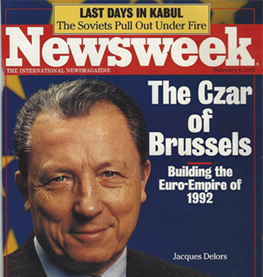
Then, on 1 January 1995, Austria, Finland and Sweden acceded to the EU. It was EEA membership that had made this possible so quickly. Veli Sundbäck, the former chief negotiator of Finland, noted: "For us in Finland the EEA greatly facilitated our accession negotiations." Anders Olander, a former negotiator of Sweden, explained how the EEA was "a stepping-stone towards full membership of the EU." He called joining the Single Market "the best European Integration School that I can think of – we would not have been able to conclude our accession negotiations so easily and rapidly as was the case."
More:
European Economic Area 1994-2009, EFTA Commemorative publication
In 1989 governments in Finland, Sweden and Austria concluded that Delors' offer was in their national interest. Without this interest the EEA would never have been created. The question in 2021 is whether a similar offer on the part of the EU could be replicated and whether that would be in the interest of the Western Balkan countries: Would they accept it?
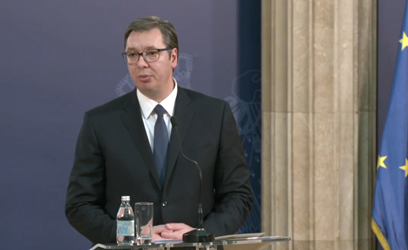
Aleksandar Vucic in Belgrade – 31 January 2020 (in Serbian):
"Predsednik Vucic i Borel se obracaju medijima"
On 31 January 2020, two weeks after the publication of our Hamster report, Serbian president Aleksandar Vucic suggested a similar idea. Following a meeting with EU High Representative Josep Borrell in Belgrade, the Serbian president suggested that the EU should offer Serbia a fair opportunity:
"to come closer to the EU's single market, to open our borders with Hungary, Croatia, Slovenia and the Schengen states. This way our citizens see concrete benefits. Of course, with an understanding that on Serbia's European path the key for us remains joining the EU as full member at the end."
Aleksandar Vucic explained that for Serbia's economy to keep growing "it is necessary for us not just to keep the peace and stability, to continue the dialogue with Pristina, but also to work in the region … and with the European Union … if we cannot join the EU right now, let us see if we can at least work on not having borders with the EU and in the Western Balkans because that would mean a lot for citizens and economies."
Towards a breakthrough in four steps
Embracing a "Finnish road to accession" proposal would transform EU-Serbian and EU-Western Balkan relations. Here is how this could happen in four steps:
Step one
The Serbian government communicates to the Slovenian government, to other EU member states concerned about enlargement policy – France, Germany, Italy, Sweden, Austria, the Netherlands – and to the European Commission that it would be interested in a process that would allow Serbia to join the EU single market once all required reforms are implemented.
Step two
The Slovenian government prepares a concrete proposal with European Union institutions to be presented at an EU-Western Balkan summit later in 2021. Such a proposal would lead to the drafting of concrete roadmaps setting out the benchmarks which countries need to meet in all 22 areas covered by the Single Market as well as for the rule of law (see Annex below).
Conveniently, most requirements for these 22 areas are already set out in detail in the EEA Agreement between the EU and Norway. Such roadmaps could chart a concrete way to realise the four freedoms between the EU and Serbia within a few years:
"The principle of free movement of goods ensures that products originating in an EEA state may circulate freely within the internal market. Customs duties and quantitative restrictions on trade in such products are prohibited within the EEA.
Through the free movement of persons, all EEA nationals have the right to work in any other EEA state. Students, pensioners and people not in paid employment also have the right to reside in another EEA state.
Under the EEA Agreement, individuals and companies enjoy freedom of establishment and the right to provide services across the EEA on equal terms.
The free movement of capital enables cross-border investment by residents and companies in the EEA, without discrimination on grounds of nationality, place of residence or place of establishment. Citizens and companies have the right to transfer money between EEA states, and to open bank accounts, invest in shares and funds, and borrow money in other EEA states."
If this looks very close to full EU membership, then this is because it is. Citizens and companies would enjoy the freedoms that citizens and companies from Norway and Iceland enjoy today. Governments in the Western Balkans could prove to sceptics in the EU that they can sustain the discipline of acceding and abiding by EU rules once inside.
Step three
The offer to join the Single Market is extended to all Western Balkan countries, including Kosovo. Once all countries have adopted the same regulatory framework and joined the Single Market it becomes possible to have these four freedoms also between the countries of the Western Balkans. The EU makes clear that this proposal is not imposed on Western Balkan countries but constitutes a fair and credible offer to those governments eager to prove that they can implement the many reforms required for integration within the next few years.
This would be a game changer also for those countries which have not yet opened accession talks: Kosovo, Bosnia-Herzegovina, but also Albania and North Macedonia.
Step Four
The EU and those Western Balkan countries interested in joining the Single Market develop an institutional framework for this, so that once countries have joined the Single Market they will, like Norway does today as member of the European Economic Area (EEA), continue to adopt future EU rules and regulations in the areas covered by the Single Market:
"A central principle of the EEA Agreement is homogeneity, which means that the same rules and conditions of competition apply to all economic operators within the EEA. To maintain homogeneity, the EEA Agreement is continuously updated and amended to ensure that the legislation of the EEA EFTA states is in line with EU Single Market legislation."
At the same time, the process of meeting the criteria for the 22 areas covered by the Single Market should be fully meritocratic, inspired by the successful visa liberalization roadmap process launched in 2008. Instead of opening and closing "chapters" one by one, roadmaps in all areas, setting out what needs to be done, should be offered to all participating countries at the very outset. Negotiations will only close when the European Commission establishes that a country is "well advanced" in all 22 fields and that it has a strong track record on the rule of law. Rule of law conditions would need to be as demanding as they are for joining the EU, to ensure that regulations are enforced everywhere in the Single Market.
Can Slovenia produce a breakthrough, again?
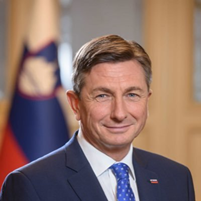
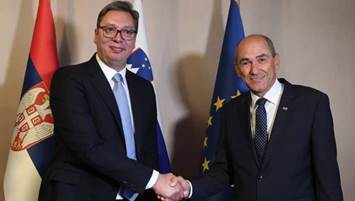
Presidents Borut Pahor and Aleksandar Vucic – prime minister Janez Jansa
In 2008 a previous Slovenian EU presidency played a pivotal role brokering a compromise to get to a meritocratic visa liberalisation process for the Western Balkans. This ended years of frustration and division on the issue within the EU and led to all Western Balkan citizens (except those from Kosovo) to be able to travel visa free to the EU by the end of 2010. It was a major success of Slovenian diplomacy.
Is a similar success possible in 2021? Recently Slovenian President Borut Pahor announced that French President Emmanuel Macron will take part in a meeting which Slovenia is organizing for Western Balkan heads of state in a few weeks. This meeting and the Slovenian presidency in the second half of this year present an important opportunity to restore EU credibility, incentivise reforms and bring the Balkans closer to the EU.
Slovenia was also strongly supportive of a visionary EU-Western Balkan Transport Community that was set up in October 2017 and includes today all six Western Balkans countries: Albania, Bosnia-Herzegovina, Kosovo, Montenegro, North Macedonia and Serbia. This Community aims at full integration in the fields "of road, rail, inland waterway and maritime transport as well as the development of the transport network between the European Union and the six Western Balkan Parties."
The treaty setting up the Transport Community lists all applicable rules, including those related to public procurement and state aid. It foresees each country becoming fully part of the EU market in this area once it meets the conditions. Potential disputes will be resolved before the European Court of Justice (ECJ) and its decisions are "final and binding." Balkan courts can also turn to the ECJ for opinions and questions just like EU member state courts. The EU contributes 80 percent to the Transport Community budget.
The Transport Community's institutional structure could easily be developed further into an institutional framework for a wider EU-Western Balkan Economic Area, including a permanent role for the European Court of Justice and the European Commission after countries accede.
The Transport Community includes a permanent secretariat in Belgrade, a Ministerial Council, which meets annually and consists of representatives of the European Commission, the six Western Balkan States and observers from any EU member state that wishes to attend. This Council provides "general policy guidelines" and "reviews progress on the implementation of this Treaty". A Regional Steering Committee prepares the work of the Ministerial Council. Decisions are by unanimity, binding and published in the official journals of the EU and of the Western Balkans.
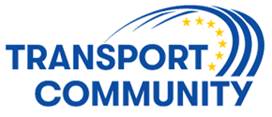

Matej Zakonjsek, Director of the Permanent Secretariat of the Transport Community
Treaty establishing the Transport Community
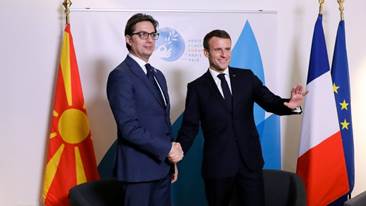
ESI Interview on Alfa TV – February 2021:
Why the Finish road to accession proposal is good for North Macedonia
Reform, energy and realistic goals
Balkan governments and administrations have worked hard in the past when they had a meaningful and inspiring interim goal before them: Montenegro (before and after accession talks began in 2012), Serbia (between 2010 and 2014), North Macedonia (at the time of answering the questionnaire and gaining candidate status 2004-2005 and again after 2017), Albania (since 2014).
Interim goals inspired reforms when they seemed meaningful. Joining the Single Market within a few years is a meaningful goal for Western Balkan societies, which can be communicated to a wider public, as the benefits are tangible.
Agricultural products could then be sold in the EU without controls; companies could cooperate across borders easily, based on the same regulations and creating employment through new chains of production. EU environmental and procurement rules would apply. Depending on which transition periods are negotiated, workers would eventually be able to move freely in the biggest market in the world.

Motivation matters: question of a child and the role of civil servants (8 December 2019)
It took Romania from February 2000 to December 2004 to complete its accession talks with the European Union. Serbia, which started accession talks in 2014, should certainly be able to complete the required reforms to join the EU Single Market within a few years. So should Montenegro, North Macedonia and all other Western Balkan countries willing to focus on this as their national policy priority in the coming years.
A realistic promise of a better life is the most powerful incentive for Western Balkan reformers. It would also be in the interest of the EU to reassert its influence in a region of strategic importance by offering again a credible perspective of a better future that is within sight.
Joining the Single Market and removing all non-tariff barriers would provide the Balkan economies with real and immediate benefits. The historic record is clear:
GDP per capita (in purchasing power standards), EU-28=100
|
Country |
1999 |
2018 |
2018/1999 |
|
Lithuania |
36.8 |
80.8 |
+44.0 |
|
Estonia |
40.0 |
81.6 |
+41.6 |
|
Romania |
26.4 |
65.6 |
+39.2 |
|
Latvia |
34.8 |
68.9 |
+34.1 |
|
Bulgaria |
27.3 |
50.8 |
+23.5 |
|
Slovakia |
50.4 |
73.1 |
+22.7 |
|
Poland |
47.7 |
70.3 |
+22.6 |
|
North Macedonia |
n/a |
36.2* |
n/a |
|
Serbia |
n/a |
39.9 |
n/a |
|
|
|
|
(* 2017) |
In 1999, the year the EU decided to start accession talks with Lithuania, the country had a per capita GDP that was a third of the average of EU countries. By 2009, it stood at half the EU average. In 2018 it stood at 81 percent.
Estonia stood at 40 percent of the EU average per capita GDP in 1999. By the time it joined the EU in 2004 it had reached 54 percent. In 2018 it stood at 82 percent.
Romania stood at 26 percent in 1999 when accession talks were opened. It was then the poorest candidate country. In 2018 it stood at 66 percent.
ESI on Romania's astonishing development: Timisoara 2.0 (2014)
North Macedonia stands today at the level of development where Lithuania was in 1999. Serbia stands today where Estonia was in 1999. Bosnia in 2018 is where Romania was in 1999. Carrying out the reforms needed to join the Single Market and the EU has been phenomenally beneficial for peripheral economies in recent decades. Countries and economies can catch up. For this it must be credible, merit based and serious. It has happened before. It can happen again.
Yours sincerely,

Gerald Knaus
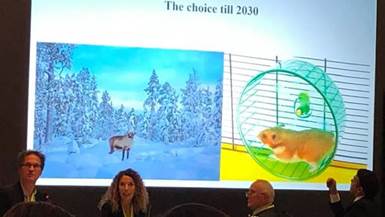
Presentation of ESI "Finnish road" proposal in Berlin in December 2019
Annex: The areas covered by the Single Market
An overview of all areas covered by the Single Market based on the EEA Agreement which list all regulations, decisions and other legislation that need to be implemented in each area:
I. Free movement of goods
1. Veterinary and phytosanitary matters
2. Technical regulations, standards, testing and certification
3. Product liability
4. Energy
II. Free Movement of Workers and self-employed persons
5. Free movement of workers
6. Social security
7. Recognition of professional qualifications
III. Right of establishment and provision of services
8. Right of establishment
9. Financial services
10. Services in general
11. Electronic communication, audio-visual services & information society
12. Transport
IV. Free movement of capital
13. Free movement of capital
V. Competition and common rules
14. Competition
15. State aid
16. Procurement
17. Intellectual property
VI. Horizontal provisions
18. Health & safety at work, labour law, equal treatment for men & women
19. Consumer Protection
20. Environment
21. Statistics
22. Company Law
Further reading
Newsletters
Hamster in the Wheel – Credibility and EU Balkan policy (16 January 2020)
Coup de grâce – Delors and squaring the circle – Norway in the Balkans (25 October 2019)
Accession revolution in Brussels – a new flagship – Usain Bolt and statistics (9 November 2015)
Reports
Measuring corruption – The case for deep analysis and a simple proposal (19 March 2015)
Enlargement and Impact – Twelve ideas – Dummy Report (Paris) (28 January 2015)
Vladimir and Estragon in Skopje – A fictional conversation on trust and standards (17 July 2014)
Enlargement 2.0 – The ESI Roadmap Proposal (Belgrade) (27 November 2014)
Videos and podcasts
The question of a child: What makes the effort required to join the EU possible? (8 December 2019)
What is more important: Political will or accession methodology? (7 December 2019)
101 On the French Veto, Balkan accession and what next (18 November 2019)
Enlargement and the benefits of competition (26 February 2014)
Some media reactions
Alfa TV (North Macedonia), "Interview with Gerald Knaus on Macedonia's EU enlargement stalemate" (22 February 2021)
Frankfurter Allgemeine Zeitung, "Dabei sein, ohne mitzustimmen" (24 January 2021)
Televizija 5 (North Macedonia), "Knaus: So vlezot vo EEZ ispolneti se 80 procenti od baranjata za vlez vo EU" (18 January 2021)
Frankfurter Allgemeine Zeitung, "Stopp der EU-Erweiterung – Was tun mit dem Balkan?" (1 January 2021)
RTS (Serbia), "Menja li bugarska blokada Severne Makedonije politiku proširenja Evropske unije" (24 November 2020)
Nova (North Macedonia), "Knaus za NOVA: Evropska ekonomska zona e podobro od ova status kvo" ("Knaus for NOVA: The European Economic Area is better than this status quo") (30 October 2019)
Koha, Veton Surroi, "Kosova si Norvegjia, Serbia si Zvicra" ("Kosovo as Norway, Serbia as Switzerland") (1 November 2019)
DW, "‘Norveški model' – vrabac u ruci za Srbiju i komšiluk?" ("‘Norwegian model' – a sparrow in hand for Serbia and the neighbourhood?") (3 November 2019)
NRC (The Netherlands), Caroline de Gruyter, "Poetin speelt stratego in onze binnentuin" ("Putin plays Stratego in our inner garden") (8 November 2019)
Der Spiegel, Markus Becker, "Streit über neue EU-Mitglieder – Frankreichs fatale Blockade" ("Fallout over new members – France's fatal blockage") (19 November 2019)
Die Welt, Thomas Schmid, "Der kleine König Macron, die Schwäche der EU und der Balkan" ("Little King Macron, the EU's weakness, and the Balkans") (21 November 2019)
Neue Zürcher Zeitung, Andreas Ernst, "Macron sagt nicht nur Nein – der französische Vorschlag für die Erweiterung der EU" ("Macron doesn't just say no – the French proposal for EU enlargement") (21 November 2019)
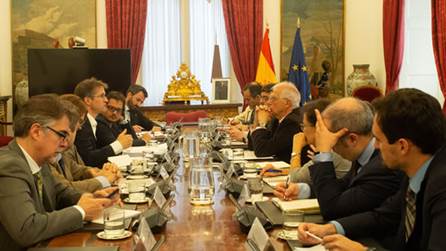
Presentation of ESI Finland proposal in Madrid – November 2019

